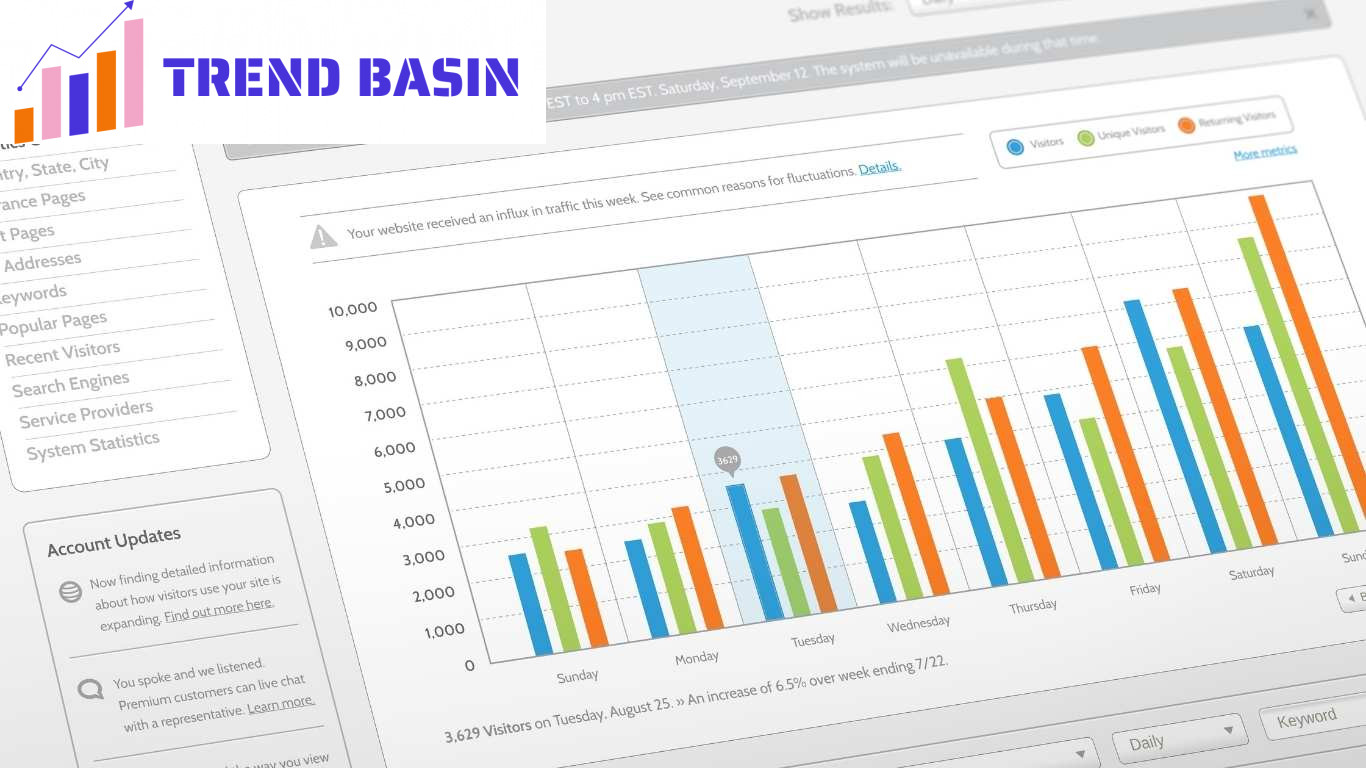Exposing SEO Myths and Revealing Effective Tactics for 2024
Navigating the ever-evolving world of SEO can be daunting, especially with numerous myths and outdated practices circulating online.
This comprehensive guide by Trend Basin aims to dispel common misconceptions, provide a deep dive into proven SEO strategies, and empower you to achieve sustainable online growth in 2024.
Key Takeaways:
- SEO is an ongoing commitment, not a quick fix: Success requires a long-term, strategic approach, constant adaptation to algorithm updates, and consistent effort.
- Quality content is the heart of SEO, but technical optimization is the foundation: A well-structured, user-friendly website with fast loading times and clear navigation is essential for search engine crawlability and a positive user experience.
- Building natural backlinks through valuable content is key to earning credibility: Earning natural links from reputable sources strengthens your online authority and credibility in the eyes of search engines and your target audience.
- User experience is paramount for both search engines and visitors: A website that is easy to navigate, understand, and engage with will be rewarded by search engines and keep visitors coming back for more.
- Staying informed about algorithm updates and adapting your strategy accordingly is crucial: Search engines are constantly evolving, requiring ongoing monitoring and adjustments to your SEO strategy to ensure you remain competitive.
1. Understanding the Fundamentals of SEO
1.1 What is SEO?
SEO, or Search Engine Optimization, is the practice of improving your website’s visibility and ranking in search engine results pages (SERPs). By optimizing your website and content for relevant keywords, you increase the likelihood of appearing higher in search results, driving more organic traffic to your website. This organic traffic consists of users who are actively searching for information related to your products or services, making it highly qualified and valuable.
1.2 Why is SEO Important?
- Increased Organic Traffic: Higher rankings in search results drive more free, organic traffic to your website, boosting your online presence and potential customer reach. Organic traffic is typically considered more valuable than paid advertising or social media traffic as users actively seek specific information related to your offerings.
- Improved Brand Visibility: A strong SEO strategy enhances your brand’s visibility and credibility online, positioning your business as a trusted and authoritative resource. This can lead to increased brand awareness, customer trust, and ultimately, more conversions.
- Enhanced User Experience: SEO best practices often align with principles of user experience (UX), resulting in a website that is easier to navigate, understand, and engage with. This leads to increased user satisfaction, lower bounce rates, and longer time spent on your site.
- Greater ROI: Effective SEO efforts can generate a higher return on investment (ROI) compared to other marketing channels, providing sustained growth and long-term value. By focusing on organic traffic, SEO can deliver a steady stream of qualified leads and customers without the ongoing costs associated with paid advertising.
2. Debunking Common SEO Myths
2.1 Myth #1: Keyword Stuffing Is Effective
Truth: Keyword stuffing, the practice of excessively repeating keywords, is detrimental to SEO. Search engines penalize websites that engage in this practice, leading to lower rankings.
Instead: Focus on using relevant keywords naturally throughout your content, ensuring it flows smoothly and provides valuable information to readers. Remember, Google’s algorithms are intelligent enough to understand the context and intent behind your content. Prioritize creating engaging and informative content that naturally incorporates relevant keywords. Use keyword research tools to identify relevant terms and phrases that your target audience uses and integrate them seamlessly into your content.
2.2 Myth #2: Backlinks Can Be Purchased
Truth: Purchasing backlinks is a risky tactic that can harm your website’s reputation. Search engines are increasingly sophisticated at detecting artificial link schemes and penalizing them accordingly.
Instead: Focus on earning natural backlinks by creating high-quality content that others find valuable and want to link to. Engage in outreach strategies to promote your content to relevant publications and websites, building authentic relationships and encouraging natural link acquisition. Focus on building relationships with other websites in your industry and providing value to them.
2.3 Myth #3: Social Media Has No Impact on SEO
Truth: While social media doesn’t directly impact SEO rankings, it can indirectly contribute to your website’s visibility. Social shares can increase brand awareness and drive traffic to your website, potentially leading to higher rankings.
Instead: Use social media to engage with your audience, promote your content, and build brand authority. Build a strong social media presence to enhance brand visibility and attract potential customers. Share your content on relevant platforms, participate in conversations, and foster a positive online community. Social media can be a powerful tool for generating referral traffic, driving brand engagement, and building backlinks.
2.4 Myth #4: SEO is a One-Time Effort
Truth: SEO is an ongoing process that requires constant monitoring and adjustments. Search engines constantly update their algorithms, so staying informed about changes is crucial.
Instead: Set up regular SEO audits, track your progress, and make necessary adjustments to your strategy to adapt to evolving search engine landscapes. Employ SEO tools and analytics platforms to track keyword rankings, website performance, and user behavior. Use this data to identify areas for improvement and refine your SEO strategy accordingly.
2.5 Myth #5: All Traffic is Created Equal
Truth: Not all traffic is equal. Traffic that comes from organic search results is generally considered more valuable than traffic from paid advertising or social media. Organic traffic is typically more qualified and engaged as users actively search for specific information related to your offerings.
Instead: Focus on building organic traffic through effective SEO strategies to acquire qualified leads and customers. Optimize your website and content for relevant keywords, build high-quality backlinks, and provide a seamless user experience to attract and retain organic traffic. By focusing on attracting organic traffic, you can build a sustainable and scalable audience for your website.
3. Effective SEO Tactics for 2024 Success
3.1 Content Optimization: The Heart of SEO
- Create valuable content that solves problems for your audience. Develop content that addresses your target audience’s pain points, answers their questions, and provides valuable insights. Focus on creating content that is informative, engaging, and genuinely helpful to your audience.
- Optimize your content for relevant keywords, but prioritize readability and engagement. Use keywords strategically but ensure your content remains engaging and easy to read. Use keyword research tools to identify relevant terms and phrases that your target audience uses and integrate them seamlessly into your content.
- Focus on creating different types of content: This includes blog posts, articles, infographics, videos, and interactive content to cater to various audience preferences and engagement styles. Diversify your content strategy to appeal to a broader range of users.
- Regularly update and refresh your content to keep it fresh and relevant: Continuously update your content to maintain its relevance and address evolving search trends. Keep your content fresh and engaging to attract returning visitors and encourage sharing.
3.2 Technical SEO: Building a Solid Foundation
- Ensure your website is mobile-friendly and loads quickly: A mobile-friendly website is essential for optimal user experience and search engine ranking. Ensure your website loads quickly to avoid losing users due to slow loading times.
- Optimize website structure for search engine crawlability: Structure your website effectively for search engines to crawl and index your content easily. Use clear navigation, internal linking, and sitemaps to facilitate crawlability.
- Implement structured data (schema markup): Schema markup provides structured data to search engines, enhancing their understanding of your website’s content and improving search results visibility.
- Optimize for site speed: Improve your website’s loading speed by compressing images, minifying code, and optimizing your website’s hosting. Faster loading times lead to improved user experience and better SEO rankings.
3.3 Backlink Building: Earning Credibility and Trust
- Create compelling content that attracts natural backlinks: Develop high-quality, informative content that encourages other websites to link to it. Focus on creating content that is unique, valuable, and relevant to your target audience and other websites in your niche.
- Reach out to relevant websites and publications for link opportunities: Engage in outreach strategies to promote your content to relevant publications and websites, building authentic relationships and encouraging natural link acquisition. Develop a targeted outreach plan and build relationships with other website owners and bloggers in your industry.
- Participate in guest blogging and online forums to build your online presence: Establish yourself as an authority in your field by contributing guest posts and participating in online forums, building valuable backlinks and increasing brand visibility.
- Develop a backlink strategy: Use a variety of methods to acquire backlinks, including content marketing, guest blogging, social media promotion, and outreach to industry influencers.
3.4 Voice Search Optimization: Addressing Conversational Queries
- Optimize your content for long-tail keywords and conversational queries: Adapt your content to address conversational search queries and long-tail keywords, which are becoming increasingly prevalent with the rise of voice search.
- Use schema markup to provide structured data to voice search engines: Implement schema markup to enhance the visibility and relevance of your content in voice search results.
- Develop content that answers common questions in your industry: Create content that addresses frequently asked questions in your industry, ensuring your website appears in relevant voice search results.
- Think about the language people use in voice searches: Use natural, conversational language in your content to appeal to voice search users. Voice search is becoming increasingly popular, so optimizing for conversational language is crucial.
3.5 Analytics and Tracking: Measuring Success and Refining Strategies
- Use SEO tools to track your keyword rankings, organic traffic, and website performance. Utilize SEO tools to monitor your keyword rankings, track organic traffic, and assess website performance, providing valuable insights for optimization.
- Regularly analyze your data to identify areas for improvement. Regularly analyze data from SEO tools and analytics platforms to identify areas for improvement in your website and content optimization. Identify trends, track your progress, and make informed decisions about your SEO strategy.
- Adjust your strategy based on insights gained from your data analysis. Continuously refine your SEO strategy based on the insights gathered from data analysis, ensuring your efforts are aligned with current trends and user behavior.
3.6 Local SEO: Targeting Customers in Specific Geographic Locations
- Optimize your Google My Business listing: Ensure your business information is accurate and up-to-date, and encourage customers to leave reviews. A well-maintained Google My Business listing is essential for local visibility.
- Include local keywords in your website content and meta descriptions: Use keywords that reflect your geographic location, such as “Singapore web design” or “web design services in Singapore.”
- Build local citations: List your business on relevant online directories and local business listings. Increase your visibility in local search results by creating citations on prominent online directories.
- Engage with local communities: Participate in local events, forums, and social media groups. Build relationships with local businesses and organizations and participate in relevant online communities.
4. Real-World Case Studies: Demonstrating SEO Success
4.1 Case Study 1: “X” Company:
“X” company, a local business in Singapore, struggled to attract online customers. By implementing a comprehensive SEO strategy focusing on high-quality content, technical optimizations, and building backlinks, they saw a significant increase in organic traffic and sales within six months. Their website content was optimized for relevant keywords, their website structure improved for search engine crawlability, and they engaged in outreach efforts to acquire natural backlinks from reputable websites.
4.2 Case Study 2: “Y” Company:
“Y” company, a tech startup, focused on optimizing for voice search by creating content that answered common questions in their industry and using schema markup to provide structured data to voice search engines. As a result, they experienced a significant increase in organic traffic from voice search and improved their overall SEO rankings.
5. Conclusion: Embracing the Future of SEO
SEO is a dynamic and essential element for online success. By debunking common myths and implementing proven tactics, you can build a robust SEO strategy for sustainable growth in 2024.
Remember, SEO is an ongoing process that requires constant adaptation and improvement. By staying informed, embracing best practices, and continuously refining your strategy, you can achieve lasting success in the digital landscape.
Trend Basin (https://trendbasin.com/) is committed to helping businesses achieve their online goals through strategic SEO solutions. Contact us today to discuss your specific needs and learn how we can help you achieve SEO success.



